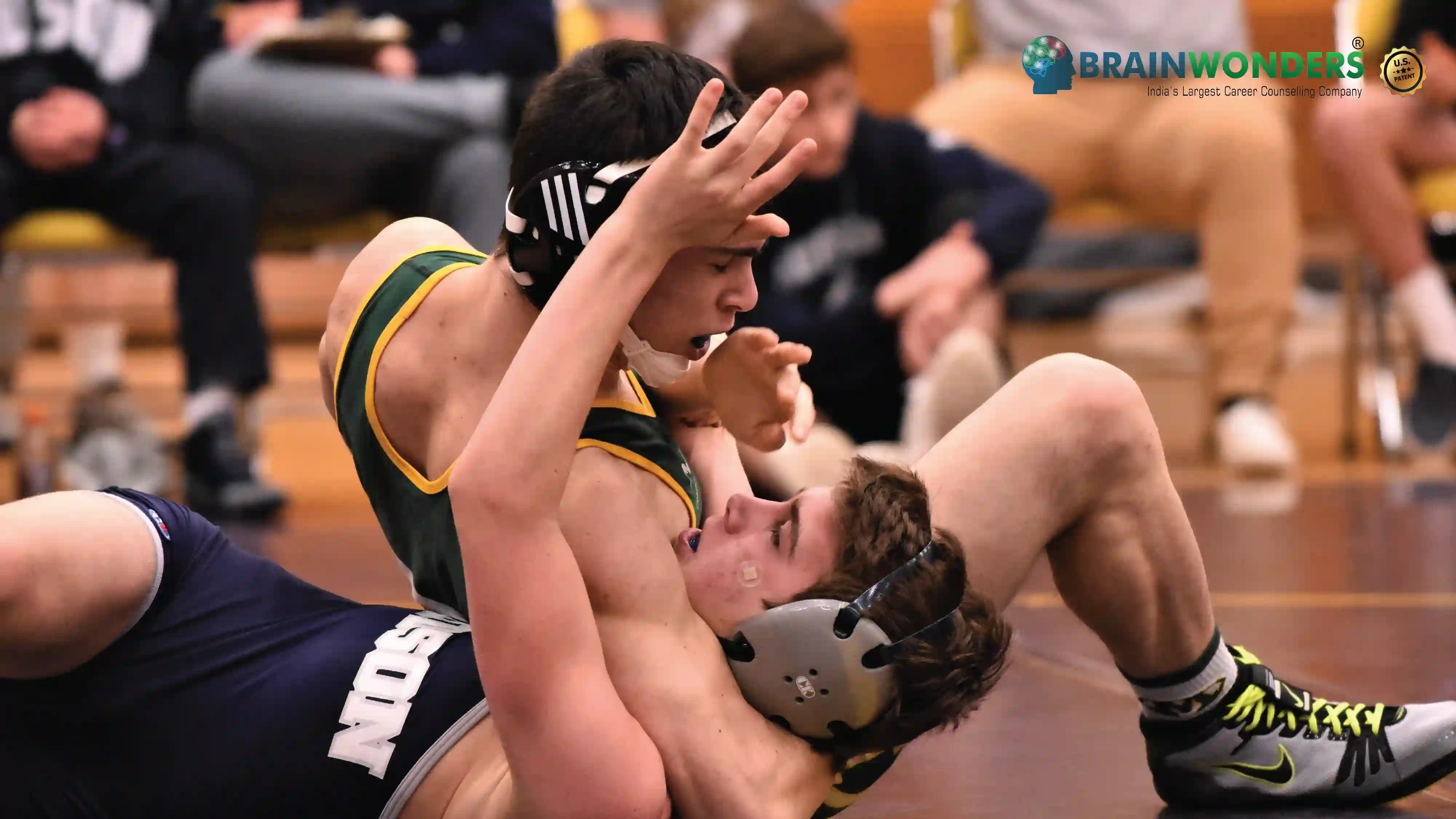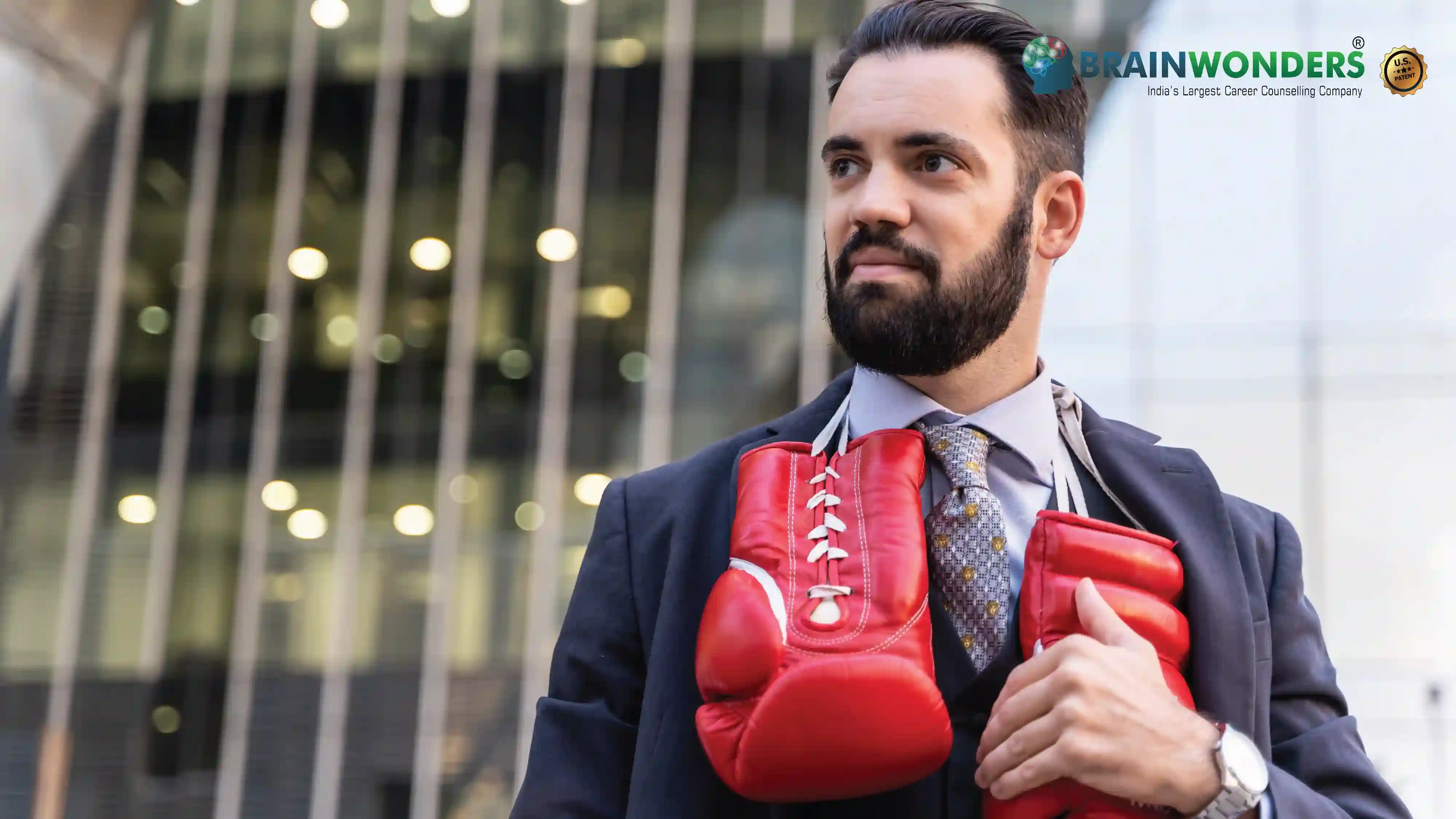How to become a Wrestler
Overview, Courses, Exam, Colleges, Pathways, Salary

Overview
Who is Wrestler ?
A wrestler is an athlete who participates in the sport of wrestling. Wrestling is a combat sport that involves two individuals engaging in a physical contest of grappling techniques, holds, throws, and takedowns to pin their opponent to the mat or score points. Wrestlers compete in various styles, including freestyle, Greco-Roman, and folkstyle, each with its own rules and techniques.
Wrestlers require strength, agility, endurance, and technical skill to succeed in the sport. They undergo rigorous training to develop their physical attributes, improve their technique, and enhance their overall performance. Wrestlers often participate in weight classes to ensure fair competition based on size and weight.
Wrestling has a rich history and is practiced at amateur and professional levels. Wrestlers may compete in school or college athletics, regional and national tournaments, and international competitions, including the Olympic Games.
In addition to the physical aspects, wrestling emphasizes discipline, mental toughness, and sportsmanship. Wrestlers learn values such as resilience, dedication, and respect for opponents.
Wrestling has a dedicated fan base worldwide, with enthusiasts following the sport and supporting their favorite wrestlers. The sport showcases impressive displays of athleticism, strategy, and sheer determination.
Typical day at work
What does Wrestler do?
Wrestlers participate in wrestling, engaging in various activities and responsibilities related to their training, competition, and overall career. Here are some of the critical things that wrestlers do:
- Training and Conditioning: Wrestlers undergo rigorous training to develop their physical fitness, strength, agility, and endurance. They engage in regular workouts, conditioning exercises, and technique drills to improve their grappling skills, takedowns, and defensive maneuvers.
- Technique Development: Wrestlers focus on honing their technical skills, learning different holds, throws, and grappling techniques. They work with coaches and trainers to refine their moves, transitions, and overall strategy on the mat.
- Weight Management: Many wrestlers participate in weight classes, requiring them to manage their weight to compete within a specific category. It involves following specialized diets, monitoring nutrition, and employing weight-cutting techniques to meet weight requirements before competitions.
- Competing in Matches: Wrestlers participate in wrestling matches, competing against opponents in various settings such as school or college athletics, regional tournaments, national championships, and international competitions. They strive to win matches by pinning their opponents or scoring points through takedowns, escapes, reversals, and near falls.
- Mental Preparation: Wrestling requires mental toughness and focus. Wrestlers use mental preparation techniques such as visualization, goal setting, and managing performance anxiety to optimize their mindset and perform their best during matches.
- Physical and Injury Management: Wrestlers take measures to prevent injuries through proper warm-ups, stretching, and strength training. In the event of injuries, they work with medical professionals to rehabilitate and recover, often undergoing physical therapy and following a structured recovery plan.
- Coaching and Mentoring: Experienced wrestlers may take on coaching or mentoring roles, sharing their knowledge and skills with aspiring wrestlers. They may assist in training sessions, guide technique and strategy, and support teammates or younger wrestlers.
- Promotions and Professional Wrestling: Some wrestlers pursue professional wrestling careers, which involve performing scripted matches for entertainment. Professional wrestlers may work for wrestling promotions, participate in televised events, and engage in character development and storytelling to entertain audiences.
Abilities and Aptitude needed
What are the skills, abilities & aptitude needed to become Wrestler?
Becoming a wrestler requires a combination of physical attributes, skills, abilities, and aptitude. Here are some critical qualities needed to pursue a career in wrestling:
- Physical Fitness: Wrestlers must possess excellent physical fitness, including strength, endurance, flexibility, and agility. They need regular strength training, cardiovascular exercises, and conditioning to build their physical capabilities.
- Technique and Skills: Wrestlers must develop a strong foundation in wrestling techniques, including holds, takedowns, escapes, and reversals. They need to continuously refine and expand their repertoire of moves through practice, drills, and working with experienced coaches.
- Mental Toughness: Wrestling requires mental resilience, focus, and the ability to perform under pressure. Wrestlers must develop mental toughness to overcome challenges, handle setbacks, and maintain concentration during matches.
- Discipline and Dedication: Wrestlers must be highly disciplined and committed to their training. They must adhere to strict training regimens, diet plans, and weight management protocols and follow a consistent practice schedule.
- Strategy and Tactical Thinking: Wrestling involves strategic thinking and the ability to adapt to different opponents and match situations. Wrestlers need to analyze their opponents, identify weaknesses, and develop effective game plans to maximize their chances of success.
- Sportsmanship and Respect: Wrestlers should exhibit good sportsmanship, showing respect towards opponents, coaches, officials, and the sport itself. They should uphold the values of fairness, integrity, and respect for the rules and traditions of wrestling.
- Coachability and Learning Mindset: Wrestlers should be open to feedback, willing to learn from experienced coaches, and continuously seek to improve their skills and technique. They should have a growth mindset and embrace opportunities for growth and development.
- Work Ethic and Perseverance: Success in wrestling requires a strong work ethic, perseverance, and the willingness to put in consistent effort and hard work. Wrestlers must be willing to push through challenges, overcome setbacks, and stay dedicated to their goals.
- Teamwork and Collaboration: In team-based wrestling competitions, wrestlers must work together, support their teammates, and contribute to the overall success of the team. They should demonstrate good communication skills, teamwork, and collaboration.
- Respect for Safety and Injury Prevention: Wrestlers must prioritize safety and follow proper injury prevention techniques. They should understand injury prevention and proper warm-up routines and listen to their bodies to avoid unnecessary risks.
Salary
Salary for Wrestler?
Minimum Monthly Salary: Entry-level wrestlers in India may earn a minimum monthly salary of approximately INR 10,000 to INR 20,000, especially those starting their careers in local or regional circuits.
Maximum Monthly Salary: On the other hand, established and renowned professional wrestlers in India, who have achieved significant success and fame, may earn anywhere from INR 1,00,000 to several lakhs monthly. These earnings are typically associated with top-level wrestlers participating in major promotions or events.
Annual Salary: The annual salary could range from around INR 1,20,000 to INR 2,40,000 for entry-level or lesser-known wrestlers. In contrast, experienced and highly popular wrestlers may see their annual income soar to INR 12,00,000 or more.
Highest Paying Opportunities and Scope: The wrestling industry in India offers various opportunities for growth and success. The top-earning positions are typically occupied by wrestlers who have secured contracts with prominent wrestling promotions, leading to substantial compensation from matches, merchandise sales, and endorsements. Wrestlers who become household names and attract a large fan following can capitalize on their popularity through appearances, sponsorships, and media ventures, further enhancing their earnings.
Pathways
How to become an Wrestler?
Entrance Exam
Entrance Exam for Wrestler ?
Courses
Which course I can pursue?
Best Colleges
Which are the best colleges to attend to become an Wrestler?
Industries
Which Industries are open for Wrestler?
Wrestlers primarily find opportunities within the professional wrestling industry. However, there are also related industries where wrestlers can explore career avenues. Here are some industries that are open for wrestlers:
- Professional Wrestling: The professional wrestling industry offers numerous opportunities to showcase their skills and entertain audiences. It includes working for major wrestling promotions, such as WWE (World Wrestling Entertainment), AEW (All Elite Wrestling), Impact Wrestling, and other regional or international wrestling organizations.
- Sports Entertainment: Wrestlers can find opportunities in sports entertainment, which encompasses live events, television shows, and pay-per-view broadcasts. They can participate in scripted wrestling matches and perform as characters with developed storylines, captivating audiences with athleticism and showmanship.
- Independent Wrestling Circuit: Independent wrestling promotions provide platforms for wrestlers to gain experience, develop their characters, and hone their skills. This circuit allows wrestlers to build a fanbase, improve their craft, and transition to more extensive promotions.
- Acting and Entertainment: Wrestlers often have opportunities to venture into the acting and entertainment industries. With their physical presence, charisma, and stage presence, wrestlers can pursue acting roles in movies, television shows, commercials, or other entertainment projects.
- Fitness and Personal Training: Wrestlers have a solid foundation in physical fitness, conditioning, and strength training. They can leverage their expertise to pursue careers in fitness training, personal training, or coaching, helping others achieve their fitness goals.
- Merchandise and Branding: Successful wrestlers often build their brand and have merchandise lines associated with their characters. They can explore opportunities in the merchandise industry, including clothing, accessories, collectibles, and other branded products.
- Wrestling Promotion and Management: Some wrestlers transition into roles behind the scenes, working in wrestling promotion and management. They may become promoters, bookers, agents, or talent scouts, involved in organizing events, managing talent, and shaping the direction of wrestling promotions.
- Motivational Speaking and Coaching: Wrestlers who have achieved success and overcome challenges can share their experiences and inspire others through motivational speaking engagements. They can also offer coaching and training services to aspiring wrestlers or individuals looking to enhance their fitness and personal development.
internship
Are there internships available for Wrestler?
Internship opportunities tailored explicitly for wrestlers may not be as common as in other fields. However, there can be internships or related programs that aspiring wrestlers can consider to gain valuable experience and develop their skills. Here are a few avenues to explore:
- Wrestling Schools and Training Centers: Some wrestling schools or training centers may offer internship programs or apprenticeships for individuals seeking a career in professional wrestling. These programs can provide hands-on training, mentorship, and exposure to the wrestling industry.
- Wrestling Promotions and Independent Circuits: Independent wrestling promotions may allow aspiring wrestlers to gain experience by participating in their events or assisting behind the scenes. It can provide valuable exposure, networking opportunities, and a chance to learn from seasoned professionals.
- Sports Entertainment Companies: Companies involved in sports entertainment, such as professional wrestling promotions or entertainment organizations, may have internship programs in event management, production, marketing, or creative writing. While these positions may not involve in-ring wrestling, they can provide insights into the industry and contribute to a well-rounded understanding of the field.
- Fitness and Training Facilities: Interning at fitness centers, gyms, or training facilities specializing in combat sports and athletic conditioning can provide valuable experience for wrestlers. Assisting with training sessions, learning about fitness programming, and gaining exposure to various training techniques can enhance their skills and understanding of physical fitness.
- Media and Broadcasting: Interning with media outlets that cover wrestling, such as television networks, online platforms, or wrestling-focused publications, can offer insights into the media side of the industry. Interns may have opportunities to contribute to content creation, interviews, research, or production aspects related to wrestling.
Career outlook
What does the future look like for Wrestler?
The future for wrestlers can be exciting and rewarding, with opportunities for growth and success within the professional wrestling industry. Here's an overview of the career outlook for wrestlers:
- Professional Wrestling Industry: The professional wrestling industry thrives, attracting a dedicated fan base and global audience. Major promotions like WWE, AEW, Impact Wrestling, and others provide platforms for wrestlers to showcase their skills and entertain millions of viewers. The industry offers a range of opportunities for wrestlers to develop their characters, compete in high-profile events, and achieve fame and recognition.
- Expanding Platforms: With the rise of streaming services and online platforms, wrestlers have additional avenues to reach audiences. The growing popularity of independent wrestling circuits, online promotions, and social media platforms allows wrestlers to gain exposure, build fan bases, and create unique brands.
- Cross-Industry Collaborations: Wrestlers have opportunities for collaborations beyond wrestling. They can venture into acting, media appearances, reality shows, and endorsement deals. Wrestlers' charisma, athleticism, and larger-than-life personalities make them sought-after talents in the entertainment industry.
- International Reach: Wrestling has a global appeal, and wrestlers can explore opportunities in different countries and regions. International promotions and cross-promotional events allow wrestlers to compete globally and gain exposure to diverse audiences.
- Entrepreneurial Ventures: Successful wrestlers often have the opportunity to develop their brand and business ventures. They can establish merchandise lines, launch podcasts, create online content, and engage in personal appearances and conventions, leveraging their fan base and brand for entrepreneurial endeavors.
- Coaching and Mentorship: Experienced wrestlers can transition into coaching or mentorship roles, passing on their knowledge and expertise to aspiring wrestlers. It can include working as trainer in wrestling schools, developing talent in promotions, or mentoring up-and-coming wrestlers.



.webp)

